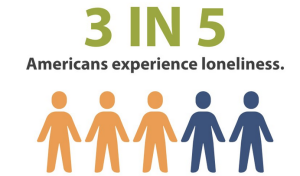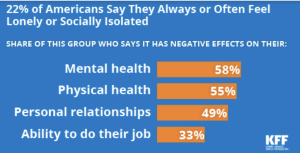Thanks to our increasingly busy and more demanding lives, many of us will often crave for just a few moments of solitude, when no-one is about, and one can truly relax.
But while we might appreciate these rare moments of stillness without distraction, very few of us will ever relish loneliness.
Loneliness is the subjective experience of feeling alone and dissatisfied with your social relationships and networks.
Social isolation often accompanies it and can impact people regardless of age, gender and other differences.
But, worryingly there is a growing body of evidence to suggest people are feeling more lonely than ever.

Types of loneliness
There are three types of loneliness.
There is ‘emotional loneliness’, which arises when a significant person leaves your life, either at work or home.
There is ‘social loneliness,’ which occurs when, for some reason, one is not part of a social network that leads to a feeling of belonging and community.
Finally, ‘existential loneliness’ happens when one feel disconnected from others and people consider life to be empty.
These can transpire at work and at home. And, of course, the three types co-occur.
The impact of loneliness on mental health at work
Any of these forms of loneliness are damaging, but the fact is, some jobs lend themselves more easily to loneliness, and for this reason alone (but there are many others), businesses need to start addressing it more.
Just think about it. People who travel or work in rural areas have limited opportunities to interact with colleagues.
Employees that have a lot of responsibility, perhaps as a manager or team leader, can also suffer from extreme loneliness, because they are unable to share their views and concerns with subordinates and other leaders may not be accessible, especially if they are in different locations.
Joining a new organization also can cause loneliness, at least at the start.
In addition, personal factors, such as divorce, parenthood, and mental health problems, can lead to isolation.
Business needs to address it.
The reality of loneliness in the workplace
The reality is that many feel lonely at work, and approximately 25% of surveyed individuals reported that this negatively impacted their mental health.
This is an intersectional issue and affects everyone, regardless of their diversity.
The problem with at-work loneliness, is that it can cause so many other ills too.
Social isolation and loneliness, which often accompany each other, lead to greater health risks than obesity or smoking.
This is exactly why it is so vital to address these issues.
Take mental health. Loneliness, of itself, does not cause mental health problems, but it is often an essential component of someone’s mental health deteriorating.
When we don’t have sufficient social connections, there is a cognitive, emotional, and physiological effect.
When these factors start to play out, employee often find it difficult to build trust and communicate well and so their wellbeing further suffers. Then, loneliness creates a vicious cycle whereby it negatively affects mental health and vice versa.
Lonely people feel the workplace is against them


A lonely person may ‘perceive’ that barriers exist, preventing them from engaging.
They may have negative appraisals of themselves and others and these then almost guarantee that the person won’t try to interact. This perpetuates their feeling of being alone, and so it becomes a self-fulfilling prophecy.
The person who is lonely may experience lowered confidence and self-esteem.
They could feel powerless.
Their ability to function at work deteriorates.
Motivation and performance are poor.
Sick leave and absenteeism could increase.
They are more likely to worry and ruminate, which can lead to a skewed perspective of the world.
People who are lonely can be prone to sleep problems and their physical health may be affected.
They can also develop anxiety and depression, which then interact with their state of loneliness. One feeds the other. They may self-harm or misuse substances such as alcohol.
Persistent loneliness negatively affects not only those with a mental health history, but also the ordinary employee.
It is imperative that leaders and managers work to address it healthily.
So, what can leaders and managers do about it?
Very few of us speak about emotions openly, especially in a business setting.
And we are reluctant to name and address loneliness and its impact.
Therefore, the first step for CHROs is to encourage staff and/or be ready to talk about this topic.
Perhaps start by considering why you, as a leader or manager, have been reluctant to address this. What are your biases and mis-perceptions?
Once you have opened this discussion, think about what the aim is in your organization in relation to loneliness?
You cannot eradicate it, and it is not an illness. But, it is an emotional state that can be perpetuated at work and, sometimes, by the life circumstances of the employee.
The overall aim should be to find out what in the organization is contributing to people feeling lonely.
Look at the work practices and roles.
To what extent do these facilitate social interaction and community as opposed to blocking them?
If your organization is competitive, then how is this enacted. Is it collaborative or is there a fight to be the winner?
Do all this and you can start to look at which roles can start to minimize social isolation.
For example, how are new staff welcomed?
Do you have a buddy system?
What formal and informal support is there for leaders and managers in very senior positions?
How do you say goodbye to a trusted colleague and honour their contribution?
How do you facilitate psychological closure for those left behind?
How can leaders and managers encourage social interaction and cohesion in their teams meaningfully, without resorting to obligatory bring-and-share lunches that staff must attend?
Basically, ask staff what they want.
Slowly you can change things
By giving people the opportunity to talk about their feelings, about the possibility of being lonely, and of coping with work worries, things can improve.
Doing this consistently should lead to a shift in the culture so that people can be their true selves at work rather than pretending to be the happy and compliant employee- a false role.
When we name what is known but not spoken about often, it brings great relief.
Having more social connection and collaboration as a common goal across work practices and cultures is a great start.
But I would add that this needs to be accompanied by changes in policy and procedure democratically, so that people don’t feel obliged to be social.
Some people will readily accept this, and others may find it difficult, especially if they have a difference that may make being extraverted hard.
So, ensure that you allow people space and time to talk about the match or mismatch between their personal purpose and that of the organisation.
Discuss how to live with compromise, which is inevitable.
Make sure you allow those whose mental health is at risk the opportunity to seek professional support with dignity and privacy. Ensure that any stigma around this is addressed.
It is good that we are now considering loneliness and its effect on staff’s mental health.
What will be better is if we acknowledge its importance and use it to bring in our humanness for ourselves, as leaders, for staff and for everyone’s human frailties.
